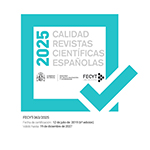Theoretical and conceptual approaches for a feminist epidemiology
Abstract
Introduction. Epidemiology as a theoretical-methodological tool in the analysis of health-disease and care processes has, as heir to the biomedical sciences, a patriarchal character that makes experiences invisible and favors the current economic system on which all inequalities are based. In this context, a look from feminist epistemologies is necessary to rethink health research, taking as a premise the ethical and political positioning for social transformation. Objectives. To raise the possibility of a feminist epidemiology through the critical tradition, social medicine, and feminist epistemologies. Methodology. The relevance of a feminist critique of the construction of knowledge in health and epidemiology to address the social determination of health-disease processes in the context of neoliberal capitalism is presented. Discussion. Hegemonic epidemiology maintains a scheme of monocausal explanations that limits the understanding of health-disease processes, especially related to women's experiences. Moving from concepts such as economic income to the precariousness of life, proposed by feminist thinkers, gives epidemiology a new meaning. Conclusions. Making evident the political intention of the research, taking as a source the individual experiences under a materialistic view that makes visible the structures and unequal power relations, as well as retaking conceptual and methodological baggage from the social sciences is enriching for epidemiological practice; in general, a feminist proposal makes the analysis of health-disease processes more complex to escape from the risk approach characteristic of biomedicine.
Downloads
Article download
License
In order to support the global exchange of knowledge, the journal Investigaciones Feministas is allowing unrestricted access to its content as from its publication in this electronic edition, and as such it is an open-access journal. The originals published in this journal are the property of the Complutense University of Madrid and any reproduction thereof in full or in part must cite the source. All content is distributed under a Creative Commons Attribution 4.0 use and distribution licence (CC BY 4.0). This circumstance must be expressly stated in these terms where necessary. You can view the summary and the complete legal text of the licence.











